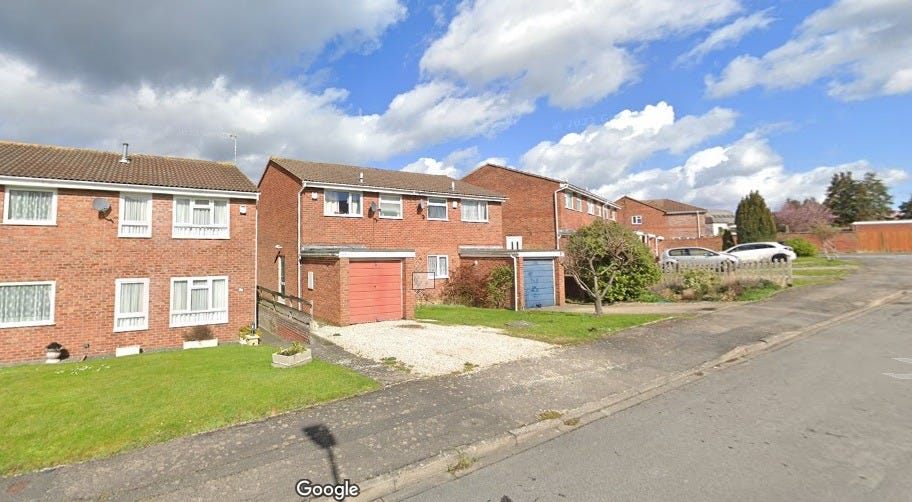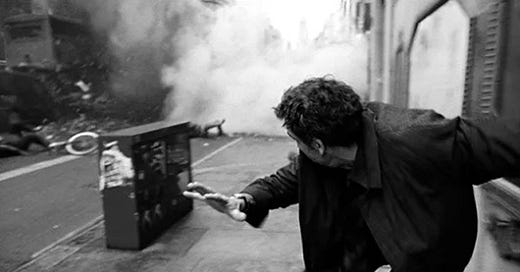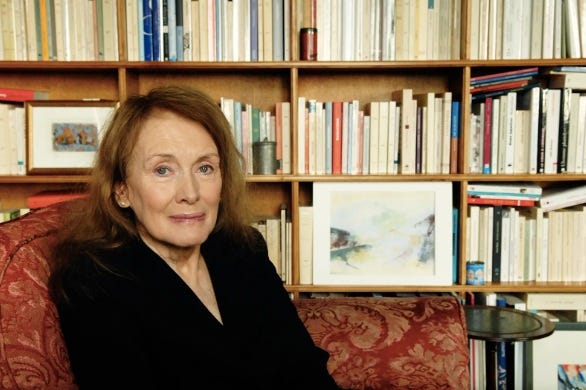Take away all the inventions of the 21st century. Personally, I’d be OK with it. But the one invention I’d truly miss is Google Maps. How else can I revisit my childhood home without spending a small fortune on plane tickets, train tickets, accommodation, etc.? Getting to Chandos Drive in Brockworth would be slow and laborious. I would board an Air Canada flight from Edmonton to Toronto, board another flight that would arrive at Heathrow’s Terminal 2 the following day, find my way to the Heathrow Express — the train into central London — and upon arrival at Paddington Station I’d wait around on the platform, reviving my flagging energies with a coffee and sandwich from Pret A Manger, before boarding the Great Western Railway train to Bristol, where I’d need to get out, change platform, and board the Cross Country train to Cheltenham, and from there I’d have to take the bus to Brockworth, right to the edge of the Abbotsford Estate, at which point I’d walk the final three minutes and reach my final destination.

This isn’t the first home I lived in. It’s the third, yet the first in which I formed any lasting memories. My childhood there constitutes the opening chapter of a private mythology. I compare my own mythology to whatever will be the mythology inherited by my daughters. They, naturally, will live far away from the particular experiences that I grew up with. They won’t go out picking blackberries from the hedgerows. In the place of that, maybe they’ll remember a few instances when we filched raspberries from the alleyway bushes. They won’t go on the train into Oxford or ride along on the back of their father’s motorbike. And yet they might remember fondly all the times we took the bus down Whyte Avenue or were pulled along in the blue toboggan through the Mill Creek Ravine.
As a child, I was allowed to play almost wherever I liked. My father said to not venture without him across the main road, where the traffic was heavy, and it never occurred to me to disobey him. I could walk to the home of any one of my friends. I could walk to the top of Cooper’s Hill where, every spring holiday, hundreds of contestants would chase after a round of Double Gloucester cheese — a ritual dating back centuries. One winter, adults and children alike organized an enormous snowball fight — fortifying their WWI-style trenches at either end of Chandos Drive.
Is it possible to create some kind of earthly Paradise for children to inhabit, one that represents all the good things that can be gleaned from mortal life? No, it’s not possible — not even for one family to do so — and yet that doesn’t prevent me from wanting to try. I will try and fail and try again. There will be the unseen wasp on the picnic table that tarnishes a summer afternoon, arguments in the back of the car, stress carried home from work, lunatics shouting at us on the street. Yet I hope those moments will occupy no more space than the punctuation marks in a paragraph of text. I hope my children will be able to look back when they reach my approximate age and say, my childhood was largely good, peaceful — even beautiful.
One day they will realize that they don’t live in Paradise in any respect. At that moment, it will be important to have some source for idealism — something that sways them toward never fully accepting the fallen world, and to strive for something better. If they don’t have a near-perfect childhood to look back on, where will that idealistic striving come from? This is, perhaps, a flawed way of thinking, but this is my personal motivation for attempting to create the foundation for a potential ideology, possibly even a notion of religion.
At a certain age, it becomes very clear that the world you grew up in no longer exists. Unlike in former eras, when life was cyclical, and men and women could bequeath to their children more or less the same occupations and material conditions that they had known from the earliest dawn to the latest dusk of their lives, now each generation must navigate a frantic pace of social, technological and economic changes that make their era seem distinct from previous eras.
Last week, I finished my third reading of A Man’s Place by Annie Ernaux (La Place in the original French version.) Early on, Ernaux tells the reader that she started to write a book in which her father was the protagonist. Then she realized this approach wouldn’t work. She changed her approach completely. “If I wish to tell the story of a life governed by necessity, I have no right to adopt an artistic approach, or attempt to produce something ‘moving’ or ‘gripping.’” She instead becomes the anthropologist of her own family, retrieving, curating and archiving memories, physical artifacts, taking heed of the years, historical context, and so on, working so meticulously that A Man’s Place could be left to future generations as a document of how life was for the working class in northern France during the opening two thirds of the twentieth century.
Ernaux’s father was born to a farm labourer from Caux and a convent-educated weaver from Rouen. Of her grandmother's family, Ernaux writes, "They lived in a small house with beaten earth floors and a thatched roof." Her father grew up sleeping over the stables on a straw mattress without sheets. "When I read Proust or Mauriac, I cannot believe they are writing about the time when my father was a child,” Ernaux confesses. “In his case it was more like the Middle Ages.”
Her father’s life was shaped by the seasons, material scarcity, the passing of two wars (WWI and WWII), neither of which he served in (too young for WWI, too old for WWII), yet he did his National Service all the same, and returned to the Normandy of his childhood with a determination to somehow transcend his working class roots, eventually opening a grocery store that doubled as a cafe. Social mobility is one of the book’s main themes. Ernaux’s father is described as “a tall, dark man with grey eyes, he held himself upright and was a trifle conceited.” His wife says of him proudly, “'My husband never looked working-class.”
The father’s struggle is with his circumstances — when WWII comes, for example, his little grocery store is looted. He must rebuild and is then obliged, every week, to cycle 30 kilometres to get to and from the nearest warehouse, stock up on goods, which he loads on a cart, hitches to his bike, and hauls back to his tiny business. Out of the regional fascists and communists, he refuses to pick sides, wanting only to be left alone — above all for his beloved business to be able to operate freely.
Later on, the father’s struggles are more subtle — they are with language, as his daughter goes to school and learns to speak “properly” and sometimes rebukes him for his Norman argot. The transition from one class to another is, for the daughter, an entirely successful one. By the time her father is an old man (“old” is relative here, he doesn’t quite make it to the age of 70), his daughter has completed postsecondary education, has married into the middle class, has a confident and well-fed boy for a son, and has become a school teacher. Toward the end of the book, she says of her father that “his greatest satisfaction, possibly even the raison d'être of his existence, was the fact that I belonged to the world which had scorned him." Yet this transformation is not without some awkwardness: the manners, preoccupations — even the language — of the daughter’s new family are unrecognizable to the father. He has helped birth a world he cannot personally occupy.
And the father has to concede that he has not built intergenerational wealth, which was once his goal. His business will not outlast him. Even if his daughter and son-in-law were interested in taking it over, which they are not, the business would doubtless one day succumb to socioeconomic forces beyond any family's control. When the father opened the store/cafe between the wars, there was almost no other commerce in the small Norman town. In the final years of his life, the local population has grown and a major supermarket has moved in. His store is used only for small items that shoppers might have forgotten during their main shop, and for the pleasure of lingering for a drink and a chat. That rhythm of life will not survive the father's demise and he knows it. After his death, his wife sells up and moves out.
So what was passed on from father to daughter? Certainly not an education or a gift for language or math or anything else academic. Certainly not a way of life. Possibly not even a moral code or a worldview. What is truly moving and gripping about A Man’s Place, despite Ernaux’s claim that she attempted to be neither moving nor gripping, is that the clear, clean sentences are propelled along by love. Her father made her life possible and in many ways sacrificed his own needs for hers, stood aside and was humble, so that his daughter could flourish. This book eulogizes a remarkable unremarkable man.
I learned from my father to be distrustful of advertising. Whenever we were watching television, he flicked the remote to mute the ads with the zeal of a sniper. He couldn’t stand to hear even a few seconds of the blaring voices. “An insult to my intelligence!” he would complain. “If you ever go into advertising, I will disown you,” he added, semi-seriously. So I always knew the lifepath that would bring shame and dishonour on my shoulders. I am passing on the disdain for advertising to my own children. In the place of television, it’s YouTube. I am very proud when my eldest daughter’s instructional drawing video is interrupted by an ad and she yells at the screen: “Oh come on! We don’t want to buy your stupid crap!” I’ll accept the less than savoury language if it’s directed at a deserving target. I am proud that, even with a parent always only a few metres away to intervene, she knows how to skip the ad as rapidly as possible, all by herself.
She is, as far as I am concerned, still living in Paradise. Perhaps her notion of Paradise is even more concrete than mine was. She has had the benefit of living in a two-parent household from the very beginning, whereas my own childhood was different, my father doing a lot of the heavy lifting, solo, for months and months on end. I had to go out into the world braced for the impact of an intrusive question: where is your mother? I was aware at all times of carrying a secret. And so while I don’t have a particular fondness for Philip Larkin, I can understand the sentiments that birthed “This Be the Verse”:
“They fuck you up, your mum and dad.
They may not mean to, but they do.
They fill you with the faults they had
And add some extra, just for you.”
For many people, myself included, it’s not the parents that fuck you up the most. Many of us have been lucky enough to see our parents as the custodians of the walls to a garden in which it once appeared that we would have entry forever, where we felt we could live surrounded by love and safety for the ages. It’s the world itself that lets in the darkness: the doubt, and the pain that takes the shine off the gladness, curiosity and love. One can feel the resentment creeping in: why isn’t this world better?
In “In Defense of Art in Troubled Times,” Teju Cole writes: “When I was a child in Lagos, I was normal in most respects, except for my deep and private fear of disaster… I was a member of a middle class family, my parents loved each other… But fear was the dominant note. This attitude was formed early, by the time I was ten. It was intense, and it has never left me. I perpetually felt that disaster was coming, that peace was anomalous.”
This has been exactly my disposition for as long as I can remember (and also why I reject the identitarian view of life and politics, because even though Teju Cole grew up in Lagos and I grew up in Brockworth, and he is black and I am white, whenever I read his words, a remarkable alchemy takes place — I temporarily become him, and see the world through his eyes — and nobody can convince me this isn’t one of the most astonishing transformations possible in this earthly realm.) Teju Cole can make me feel panic like no one else — the panic of a comfortable, safe life being shattered by violence, by the utter indifference to your wellbeing, to losing Paradise, or never having the chance to live there at all, even briefly.
Many children today are growing up in Hell.
Last year, it was common for images of suffering, even of the youngest children — missing limbs, bleeding from head wounds, screaming pitifully for their dead parents — to provoke online comments such as, “RELEASE THE HOSTAGES!” There were people spending countless hours on the Internet, able to countenance death and calamity on a massive scale, moved only to type a few derisive comments about how they simply didn’t care. Mutilated babies were not worthy of their sympathy. The dehumanization of an ever increasing number of humans accelerates at a pace not seen since the world wars.
There has never been a good reason why my life should be proteced while the life of a child in Gaza is not. It’s an accident of birth: a legacy from centuries of being on the winning side of history. If 2025 has any kind of coherent narrative, which is not a certainty, it might be the kind of narrative in which we privileged westerners take a peek into the abyss and realize we don’t know how far down the bottom is and how painful the landing might be. We risk losing so much: not just a way of life or a business, as was Annie Ernaux’s father’s plight; we risk losing the world itself, which may not endure in the condition that made our existence possible.
I can think of only two forces that could fortify us: a belief that this world is not the only one, and the moral code that, whatever happens, loving our neighbours and our families is about the only effort that is worth rekindling every morning. From one generation to the next, not much will endure, except those very things that matter the most.
NOTES
A metaphor I’ve not been able to get out of my mind since first encountering it is that of the termite, which Sam Kriss deployed to such great effect in his post about the failed coup in Russia in 2023. The default predicament for a person living in the 21st century is that of the fierce wood-chewing isoptera: everything we do weakens the structure of the world we live in, and yet we have an insatiable appetite to keep chewing, chewing, chewing.
Book
A Man’s Place. Annie Ernaux. Translated by Tanya Leslie. Seven Stories Press, New York. 1992. Original version, 1983, Editions Gallimard.
Essay/lecture
“In Defense of Art in Troubled Times.” Teju Cole, Art Basel.
https://www.artbasel.com/news/a-defense-of-art-in-troubled-times?lang=en
Images
Film still from Children of Men.
https://www.thematinee.ca/monochromechildrenofmen/
The photo of my childhood home is from Google Maps.
“Annie Ernaux's justly deserved Nobel.” Adam Gopnik. The New Yorker. October 9, 2022.
https://www.newyorker.com/culture/cultural-comment/annie-ernauxs-justly-deserved-nobel







I loved reading about the liminal childhood Paradises. I think in Canada we took ours for granted, and this week shook a lot of people up as we might not get through this lifetime as unscathed as expected.
You have a handsome face and you look smart